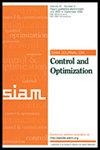Further on Pinning Synchronization of Dynamical Networks with Coupling Delay
IF 2.4
2区 数学
Q2 AUTOMATION & CONTROL SYSTEMS
引用次数: 0
Abstract
SIAM Journal on Control and Optimization, Volume 62, Issue 4, Page 1933-1952, August 2024.Abstract. Though extensively studied, the longstanding pinning synchronization problem of dynamical networks with coupling delay has not been well solved until now. In this paper, we further investigate this problem. By proposing a system of functional differential inequalities, we derive synchronization criteria for dynamical networks with coupling delay under linear pinning control, where the threshold of the admissible delay and the control gain threshold are estimated. Since the estimated control gain threshold could be very large when the delay draws close to the delay threshold, we also use the adaptive pinning control scheme to avoid control gain estimation. Pinning synchronization criteria of networks under adaptive control are derived and the delay threshold is given. This is the first time that general coupling delay has been addressed in the field of pinning control. Finally, two numerical examples are presented to validate the theoretical results.
带耦合延迟的动态网络引脚同步的进一步研究
SIAM 控制与优化期刊》,第 62 卷第 4 期,第 1933-1952 页,2024 年 8 月。 摘要具有耦合延迟的动力学网络的针销同步问题虽然被广泛研究,但长期以来一直没有得到很好的解决。本文将进一步研究这一问题。通过提出一个函数微分不等式系统,我们推导出了线性引脚控制下具有耦合延迟的动力学网络的同步准则,其中估计了可允许延迟阈值和控制增益阈值。由于当延迟接近延迟阈值时,估计的控制增益阈值可能会非常大,因此我们还使用了自适应引脚控制方案来避免控制增益估计。推导出了自适应控制下网络的引脚同步准则,并给出了延迟阈值。这是引脚控制领域首次涉及一般耦合延迟。最后,介绍了两个数值示例来验证理论结果。
本文章由计算机程序翻译,如有差异,请以英文原文为准。
求助全文
约1分钟内获得全文
求助全文
来源期刊
CiteScore
4.00
自引率
4.50%
发文量
143
审稿时长
12 months
期刊介绍:
SIAM Journal on Control and Optimization (SICON) publishes original research articles on the mathematics and applications of control theory and certain parts of optimization theory. Papers considered for publication must be significant at both the mathematical level and the level of applications or potential applications. Papers containing mostly routine mathematics or those with no discernible connection to control and systems theory or optimization will not be considered for publication. From time to time, the journal will also publish authoritative surveys of important subject areas in control theory and optimization whose level of maturity permits a clear and unified exposition.
The broad areas mentioned above are intended to encompass a wide range of mathematical techniques and scientific, engineering, economic, and industrial applications. These include stochastic and deterministic methods in control, estimation, and identification of systems; modeling and realization of complex control systems; the numerical analysis and related computational methodology of control processes and allied issues; and the development of mathematical theories and techniques that give new insights into old problems or provide the basis for further progress in control theory and optimization. Within the field of optimization, the journal focuses on the parts that are relevant to dynamic and control systems. Contributions to numerical methodology are also welcome in accordance with these aims, especially as related to large-scale problems and decomposition as well as to fundamental questions of convergence and approximation.

 求助内容:
求助内容: 应助结果提醒方式:
应助结果提醒方式:


